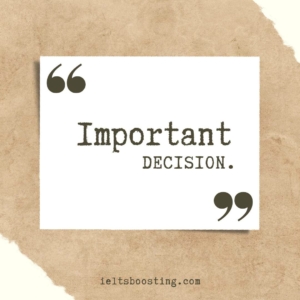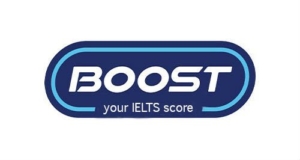Describe an important decision you have made
You should say for describe an important decision you have made
What the decision was
How you made your decision
What the results of the decision were
And explain why it was important

describe an important decision you have made
Sample for describe an important decision you have made
One of the most pivotal decisions I’ve ever made in my life was the choice to pursue higher education abroad, specifically in the United States. This decision was a significant turning point in my life, influencing my personal and professional development in profound ways.
The decision-making process for studying abroad was intricate. It involved extensive research, countless discussions with family and mentors, and a careful evaluation of my long-term goals. I assessed various factors, including the reputation of universities, available academic programs, financial considerations, and potential career opportunities. Ultimately, I decided on a master’s degree program in business administration at a renowned U.S. university.
The results of this decision were transformative. Living and studying in a foreign country exposed me to diverse cultures, broadened my horizons, and significantly improved my English language skills. I gained a global perspective and developed a deeper understanding ofinternational business practices. Furthermore, I built a valuable network of contacts and friends from around the world.
Professionally, my decision to study abroad opened doors to a range of job opportunities that would have been challenging to access in Vietnam. Upon completing my degree, I secured a position at a multinational corporation, where I could apply the knowledge and skills I had acquired during my studies.
This decision was immensely important because it not only enhanced my education but also shaped my worldview and career path. It instilled in me a sense of adaptability and resilience as I navigated a new culture and educational system. Additionally, it broadened my perspectives and helped me become a more open-minded and globally aware individual.
Explore more: ielts speaking part 2
High-level vocabulary:
● Pivotal – Quan trọng, then chốt
● Profound – Sâu sắc, uyên bác
● Intricate – Phức tạp, tinh vi
● Extensive – Rộng rãi, toàn diện
● Evaluations – Sự đánh giá
● Reputation – Uy tín
● Transformative – Mang tính biến đổi
● Horizons – Tầm nhìn
● Adaptability – Khả năng thích nghi
● Resilience – Sự kiên nhẫn, sự đàn hồi
Phrasal Verbs (Definitions in Vietnamese):
● Pursue higher education – Theo đuổi giáo dục cao hơn
● Broadened my horizons – Mở rộng tầm nhìn của tôi
● Opened doors – Mở cửa
● Navigated a new culture – Điều hướng trong văn hóa mới
● Shaped my worldview – Định hình quan điểm thế giới của tôi
Part 3 – describe an important decision you have made

describe an important decision you have made
Do you think children sometimes have to make important decisions?
Children’s decision-making is crucial for developing their critical thinking skills, as it requires them to analyze options and discern what is beneficial for themselves. Through this process, they learn to weigh the consequences and make informed choices. Although their decisions could lead to either positive or negative outcomes, the experience gained is valuable. An example of this could be allowing a child to choose their own outfit for the day. While it might seem like a small decision, it requires the child to consider the weather, the activities they have planned for the day, and their personal preference, all of which are elements of critical thinking.
What important decisions do teenagers need to make after graduation?
After graduation, one of the most important decisions teenagers face is choosing whether to pursue higher education or enter the workforce. This decision requires careful consideration of their interests, skills, and career aspirations, as well as the financial security in the future. For example, a teenager passionate about science might opt for university to become a researcher, while another may decide to start work in a family business to gain practical experience and contribute to household income.
- Pursue – To follow or engage in an activity or course of action.
- Consideration – Careful thought, typically over a period of time.
- Implications – The possible results or effects of an action or a decision.
- Aspirations – A hope or ambition of achieving something.
- Financial – Relating to money or how money is managed.
- Practical – Concerned with the actual doing or use of something rather than with theory and ideas.
- Contribute – Give (something, especially money) in order to help achieve or provide something.
Who can children turn to for help when making a decision?
Children can turn to a variety of sources for help when making decisions, including parents, who often have their best interests at heart and can provide guidance based on their own life experiences. Teachers and school counselors are also valuable resources, offering advice and support that is tailored to educational and social development. For instance, a child struggling to choose an extracurricular activity might seek advice from a coach or music teacher to understand the commitment and benefits of different options.
- Variety (đa dạng): A number of different types of things, especially ones in the same general category.
- Best interests (lợi ích tốt nhất): The most favorable benefits or advantages for someone.
- Guidance (sự hướng dẫn): Advice or information aimed at resolving a problem or difficulty, especially as given by someone in authority.
- Resources (nguồn lực): A source of help or information.
- Tailored (được điều chỉnh để phù hợp): Made, adapted, or suited for a particular purpose or person.
- Educational development (phát triển giáo dục): The process of improving education and learning skills.
- Social development (phát triển xã hội): The process of organizing human energies and activities at higher levels to achieve greater results.
- Extracurricular activity (hoạt động ngoại khóa): An activity pursued in addition to the normal course of study.
- Commitment (cam kết): The state or quality of being dedicated to a cause or activity.
- Benefits (lợi ích): An advantage or profit gained from something.
Do you think advertisements can influence our decisions when shopping?
Yes, advertisements are designed to influence our shopping decisions by highlighting the benefits of products and creating appealing images or narratives around them. They often employ persuasive tactics and emotional appeals to sway consumers’ preferences and encourage purchases. For example, an advertisement for a smartphone that showcases its cutting-edge features and sleek design can tempt a consumer to prefer that brand over others, even if they were not initially planning to buy a new phone.
- Influence (ảnh hưởng): The power to have an effect on people or things.
- Highlighting (nổi bật hóa): Emphasizing something or making people pay special attention to it.
- Appealing (hấp dẫn): Attractive or interesting.
- Narratives (câu chuyện): A spoken or written account of connected events; a story.
- Persuasive tactics (chiến thuật thuyết phục): Methods used to convince or influence someone to do or believe something.
- Emotional appeals (kháng cáo cảm xúc): Attempts to influence people’s feelings to persuade them to do something.
- Sway (làm dao động): To control or influence someone to change opinion or decision.
- Cutting-edge (tiên tiến): The most advanced stage of development; highly innovative or advanced.
- Sleek design (thiết kế mượt mà): Having a smooth, glossy, and stylish appearance.
Do you think the influence of advertising is good?
The influence of advertising can be seen as both positive and negative. It can be a powerful tool for spreading awareness about products and services that may be beneficial to consumers. It can also drive economic growth by encouraging spending and competition among businesses. On the downside, advertising can sometimes manipulate consumer choices, promoting a culture of materialism. For example, advertisements for high-end smartphones can create social pressure to upgrade devices frequently, leading to unnecessary consumption and environmental waste.
How do people usually make important decisions?
When making important decisions, people typically start by thoroughly researching and gathering information on their options. They often seek advice from trusted sources, such as family, friends, or professionals, to gain different perspectives. They then weigh the pros and cons, considering both the short-term and long-term implications of their decision. For example, someone deciding on a career path may shadow professionals in the field, consult with career counselors, and deliberate on the potential job satisfaction and growth opportunities each path offers.
- Thoroughly (kỹ lưỡng): In a detailed and careful way.
- Researching (nghiên cứu): The act of studying something carefully and trying to discover new facts about it.
- Trusted sources (nguồn tin cậy): People or documents that provide reliable information.
- Perspectives (quan điểm): A particular attitude towards or way of regarding something; a point of view.
- Weigh (cân nhắc): Assess the importance or influence of something by assigning weight or value to it.
- Implications (hàm ý): The possible effects or results of an action or a decision.
- Shadow (theo dõi): To follow someone closely in order to observe them as they work, often as part of learning how to do the job.
- Career counselors (cố vấn nghề nghiệp): Professionals who help people with their career choices, providing advice on education and employment options.
- Deliberate (cân nhắc): To think over deeply.
- Job satisfaction (sự hài lòng trong công việc): The feeling of pleasure and achievement that you experience in your job when you know that your work is worth doing.
- Growth opportunities (cơ hội phát triển): Chances or prospects for advancement and development in one’s career or personal skills.


